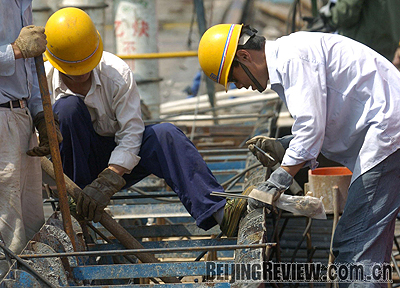|

HOT WORK: "Heat" allowances for outdoor workers in summer makethe strain more bearable
Developers Facing Reality
Boost the sluggish market by cutting or scraping relevant taxes and relaxing current credit control measures. That's the suggestion from the Shenzhen Municipal Real Estate Research Center in its recent report on the local property market. Although housing prices are falling in different cities, how far they will go is still unclear. So why is this research center so anxious to appeal for government help when it seems that the government cannot afford to let prices drop.
When prices of household appliances began to decline dramatically several years ago, no such research centers came to appeal for support for this industry. Later, instead of collapsing, the household appliance industry survived the price war and is growing in a more healthy way than before, which also bring a lot of tangible benefits to consumers. With so many different industries and sectors, why does the government have to go all out to recuperate the real estate market?
The property industry has been a cash cow for more than a decade and it is the law of market economy that is regulating its operation. Moreover, nowadays, China's real estate industry is no longer financially sound, after speculative capital had rushed into this sector. The government is by no means obliged to interfere.
Property developers have attempted to prevent an industry-wide recession by repeating such warnings as growing bad loans in banks and diminishing tax revenues. However, their arguments can prove nothing but the fact that the property industry is trying to force banks and the government to help sustain an abnormally operating real estate market, regardless of the negative consequences.
China Youth Daily
Feeling the Heat
Earlier this year, the government of central China's Henan Province promulgated a new regulation that requires local enterprises to give allowances to workers who spend long hours in the sun or in a hot environment. Street cleaners and migrant workers are among those who will benefit from this initiative.
However, in reality, most migrant workers admitted that they never expected to get an allowance of this kind and would rather their wages be paid in full and on time. The allowance allocation had also met with some derision as some officials who stayed in air-conditioned offices enjoyed the welfare at a rate even higher than the official standard.
If workers are not given the allowance as ruled, they do theoretically have recourse by making use of relevant labor protection laws and regulations, but practically they often cannot even recover their defaulted wages.
This time, Henan has listed the allowance for work in a hot environment
HOT WORK: "Heat" allowances for outdoor workers in summer make
the strain more bearable (Hao Tongqian)
as part of the mandatory labor welfare. Nevertheless, the compulsory implementation of this regulation needs strict supervision and tight regulation by relevant departments to safeguard workers' rights.
Guangzhou Daily
Streamlining Business Fees
In order to curb arbitrary charges by administrative departments, Zoucheng City, east China's Shandong Province, has adopted a single fee system. Companies now only make one payment to the government every six months in relation to operating as a business, doing away with the many willy-nilly fees currently required.
In the past, many administrative departments, either with or without permission, came up with their own charges. In some cases, the standards of fee collection were determined by collectors instead of state regulations. Sometimes, if companies bribed collectors, they would be charged less. The end result of this was corruption.
The single fee system, however, will effectively prevent shady dealings as it clearly spells out to companies what kind of fees are legal and how much the fees are. Submitting fees through designated banks as stipulated, companies don't need to deal with collectors face to face, eliminating this avenue of corruption.
The system is still at the preliminary stage and further improvement is necessary. Meanwhile, it's very important to ensure that services to companies are not affected after this system comes into operation.
Dazhong Daily
Right to Reside
Following Shanghai's example, since July 8, Hubei Province in central China has initiated a reform of the household registration (hukou) system to abolish the division between farming and non-farming residential status.
According to the new policy, most rural laborers who have fixed residences and stable jobs in cities, apart from populous downtown Wuhan, the provincial capital, can get registered as urban residents. They can also enjoy the same employment, social security, housing and education benefits as existing urban residents.
Actually, this province only has two rigid requirements for those who choose to live in cities--they must have already resided and worked there for some time and they have the means to live there independently, without relying on government support. Therefore, registration applications of those who are living below the bread line would be denied. With the two requirements, the fear that an open hukou policy will make rural population rush into cities and grab limited social resources from existing urban residents is no longer a factor.
The increasing urban population is likely to add some pressure to municipal infrastructure and social resources, but new arrivals also contribute to the vitality and rapid growth of cities.
Hubei' s reform of the hukou system represents a change of the outdated concept on this issue and has also set up a good example for the rest of the country.
The Beijing News | 